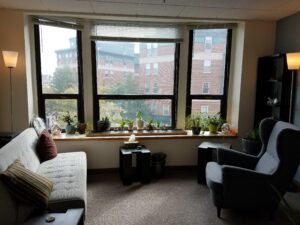 I am a licensed clinical psychologist and Part-time Clinical Faculty at Harvard Medical School with a special interest in anxiety and depression, the LGBTQ community, and couples therapy, including ethically non-monogamous individuals and couples. I am very experienced in working with issues around gender and sexuality and offer an open, nonjudgmental space to explore these areas in your life. I enjoy working with trans or nonbinary people, regardless of whether their transition is what brings them to therapy. I look for the intersections of cultural factors with my clients’ psychological difficulties and serve a diverse population in terms of gender, race, and class. I see individuals and couples aged 18 and over virtually or in-person in Cambridge and Newburyport.
I am a licensed clinical psychologist and Part-time Clinical Faculty at Harvard Medical School with a special interest in anxiety and depression, the LGBTQ community, and couples therapy, including ethically non-monogamous individuals and couples. I am very experienced in working with issues around gender and sexuality and offer an open, nonjudgmental space to explore these areas in your life. I enjoy working with trans or nonbinary people, regardless of whether their transition is what brings them to therapy. I look for the intersections of cultural factors with my clients’ psychological difficulties and serve a diverse population in terms of gender, race, and class. I see individuals and couples aged 18 and over virtually or in-person in Cambridge and Newburyport.
Training:
I received my undergraduate degree in English and Psychology at the State University of West Georgia. The psychology department there focused on humanistic approaches to psychotherapy and also incorporated eastern approaches to wellness, including mindfulness meditation.
I received my doctorate from Duquesne University in 2005. My dissertation examined online identity and relationships from psychoanalytic and post-structuralist perspectives. The psychology program at Duquesne is known for its existential/phenomenological and psychoanalytic approaches, and I still draw on these perspectives in my practice.
While at Duquesne I trained at Carnegie Mellon Univeristy Counseling Center and Persad Center, a leader in community mental health for the LGBTQ community.
I completed my internship and post-doctoral training at Harvard Medical School training sites, Massachusetts Mental Health Center and Cambridge Health Alliance. Here, I received further training in psychoanalytic treatment as well as Cognitive Behavioral Therapy (CBT) and Dialectical Behavioral Therapy (DBT).
I am a graduate of the couples and family therapy training at the Psychodynamic Couple & Family Institute of New England and current faculty for that training program and board member.
I provide supervision for clinicians in training at the Cambridge Health Alliance, a Harvard Medical School training hospital.
Approach to psychotherapy:

I draw on a variety of techniques and theories in my work, depending on the needs of the patient. My primary orientation is psychodynamic/psychoanalytic. That means that in sessions I’m listening for patterns of thought, feeling, and behavior that might be themes across your history. Those patterns may have been adaptive or necessary in the past, but may now be causing undesired effects. I work interactively with patients to understand those patterns through exploration of current challenges and personal history. Usually patients will start to spot these patterns at work in their lives outside sessions, which gives us real-life examples to think about.
Often, understanding the origin of those patterns allows patients to gain a new sense of agency or choice about things that used to feel frustrating or out of control. However, making changes to deeply entrenched narratives or behaviors can be hard work. To that end, I draw on a variety or approaches not limited to the psychoanalytic, but including also cognitive and behavioral work, mindfulness, and skill-building exercises as appropriate.
Psychotherapy works best when both therapist and patient are working actively together. I’ll trust you to bring your most important concerns to each session, to work actively with me, and to continue that work between sessions. I’ll do my best to be active and attentive, to share my thoughts with you in a way that is useful. Your questions are always welcome at any stage, and I’ll answer them as openly as possible.
One of the most important predictors for success in psychotherapy is a good relational ‘fit’ between therapist and patient. To that end, I like to consider the first couple of meetings with a new patient as a consultation during which we determine whether a good therapeutic match exists. If, for whatever reason, it doesn’t make sense for us to continue working together, I will help you find a more appropriate referral.